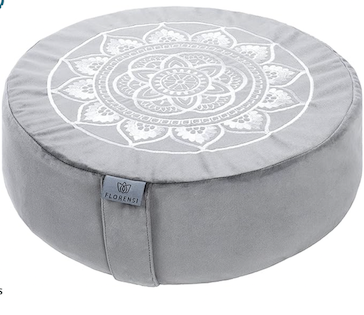5 mindfulness techniques for grounding
Mindfulness has become a bit of a buzz word lately, and for good reason. Unless you’ve been living under a rock, you know we live in a very busy world. So much of our time and attention is already spoken for, which leads most of us to lose sight of our internal landscape, largely focusing on checking things off of our to-do lists and engaging in endless negative thought loops. Mindfully becoming aware of our emotions, our thoughts and our environment, can lead to less stress and more feelings of peace and calm.
Keep reading for 5 practical techniques for grounding!
Disclaimer: This post contains affiliate links, that I may receive a commission for purchases made through my links at no extra cost to you.
1. Breathwork
Focusing on the breath can interrupt the body’s normal stress response and train the nervous system to come into a more relaxed state. Box breathing is a great beginner breathwork practice. To do this, come into a comfortable position seated or lying down and gently inhale for a count of 4, hold the breath for a count of 4, and exhale for a count of 4. Do this for 4 rounds. Box breathing has been known to reduce stress and anxiety, improve focus, and even help with sleep.
2. Body Scan
Body scan is another mindfulness practice that helps bring your focus into the present moment. By directing your focus on different parts of the body, you are training your mind to think less of the past or future and focus more on the present. To try this simple exericise, come into a comfortable position. This could be seated in a chair, on the floor, or lying down. Close your eyes and begin to scan the body for any areas of tension or stress. Wherever you feel tension or stress, intentionally relax those muscles while taking deep, healing breaths, and feel the anxiety and tension melt away.
3. Gratitude Practice
Having a daily gratitude practice can help relieve symptoms of anxiety and stress and even improve relationships. By reflecting on the good things in your life, you are directing the brain to see the positive. With repetition, your brain will naturally seek out more positive emotions. To do this, try writing down 2-3 things you are grateful for at the end of each day. Allow yourself to really feel the emotions of gratitude as you reflect.
4. Being Creative
Expressing ourselves creatively can help reduce anxiety and stress and connect us with feelings of greater purpose and satisfaction. Creativity helps to put us into a “flow state” which is a state of clear focus and attention on the present task. Being in this state can also increase feelings of accomplishment. To practice creativity, try different things like, drawing, writing, dancing, etc, and pay attention to what resonates with you. Having a creative outlet is a fantastic way to cultivate inner peace.
5. Nature Walk
Nature has unlimited benefits for the nervous system. Next time you are feeling anxious or overwhilmed, go for a walk outside. Put away all technology and focus on the environment around you. This will get you out of your head and into the present. Focus on the sounds you hear, the feeling of the temperature on your skin, the sights you see. Nature can help us to feel connected to something greater, in turn reducing feelings of anxiety or unworthiness.
Meditation Cushion - Buy on Amazon
Accupressure Mat - Buy on Amazon
Gratitude Journal - Buy on Amazon



